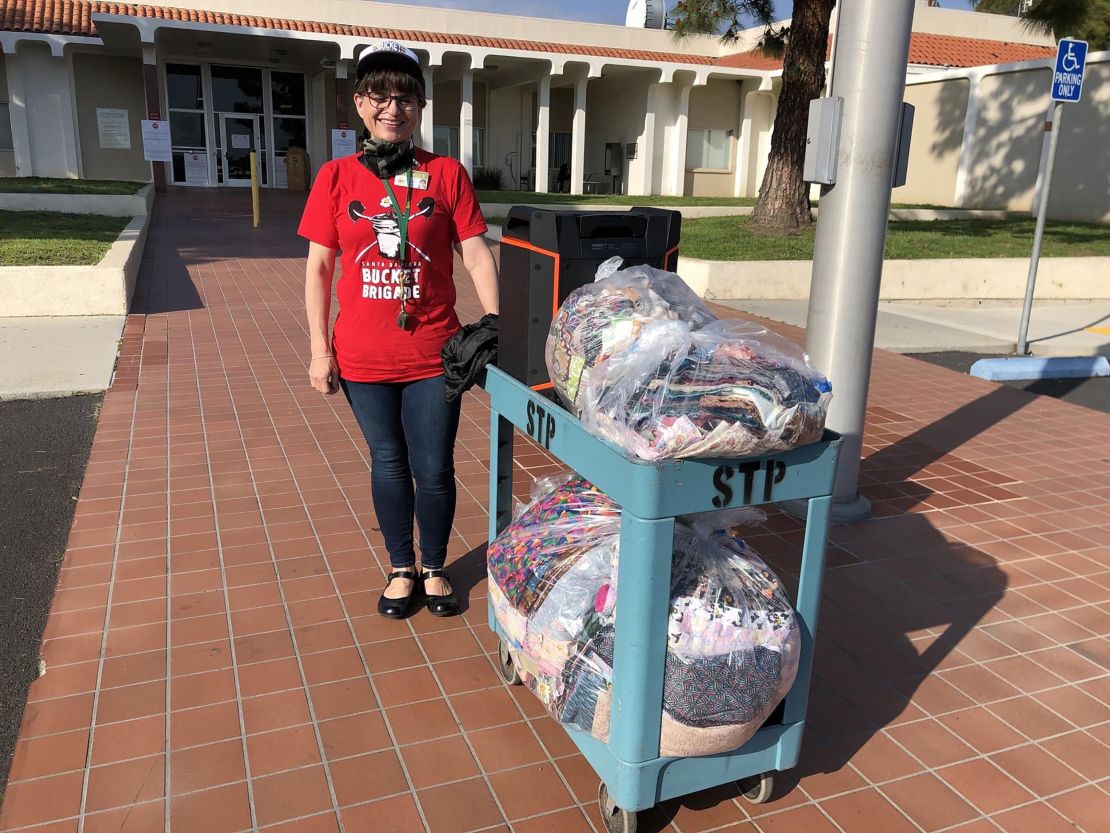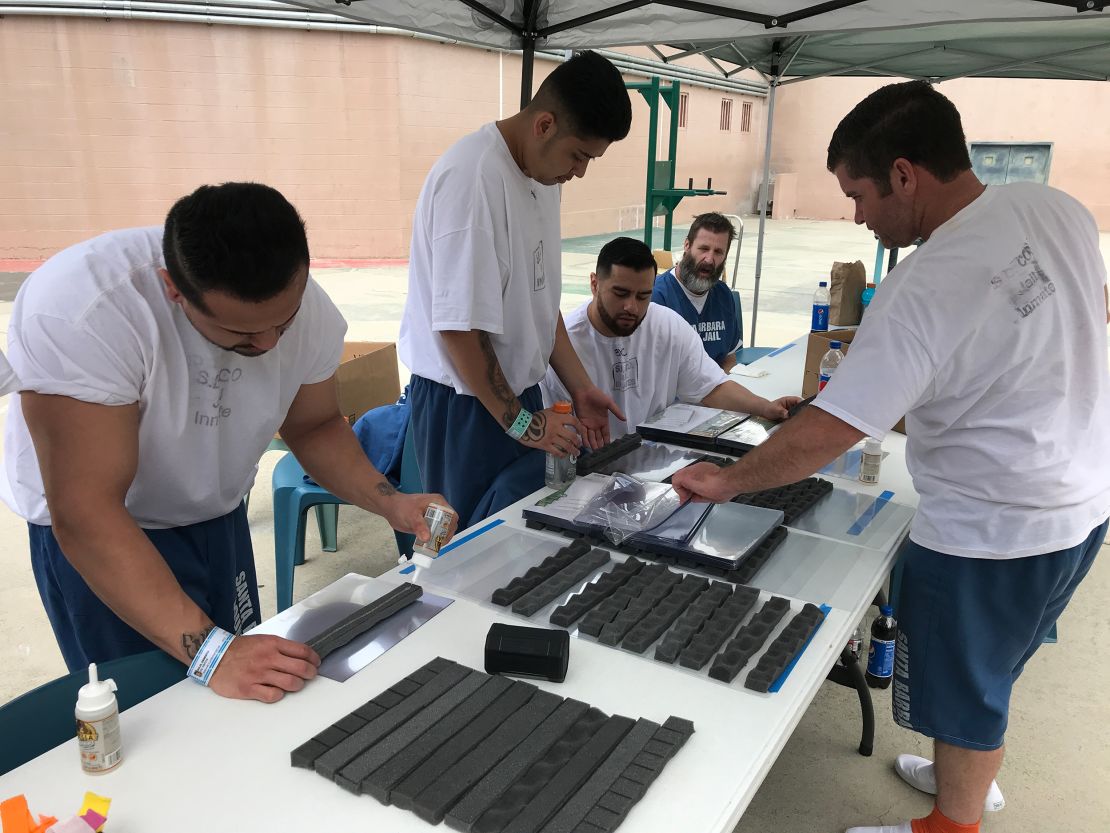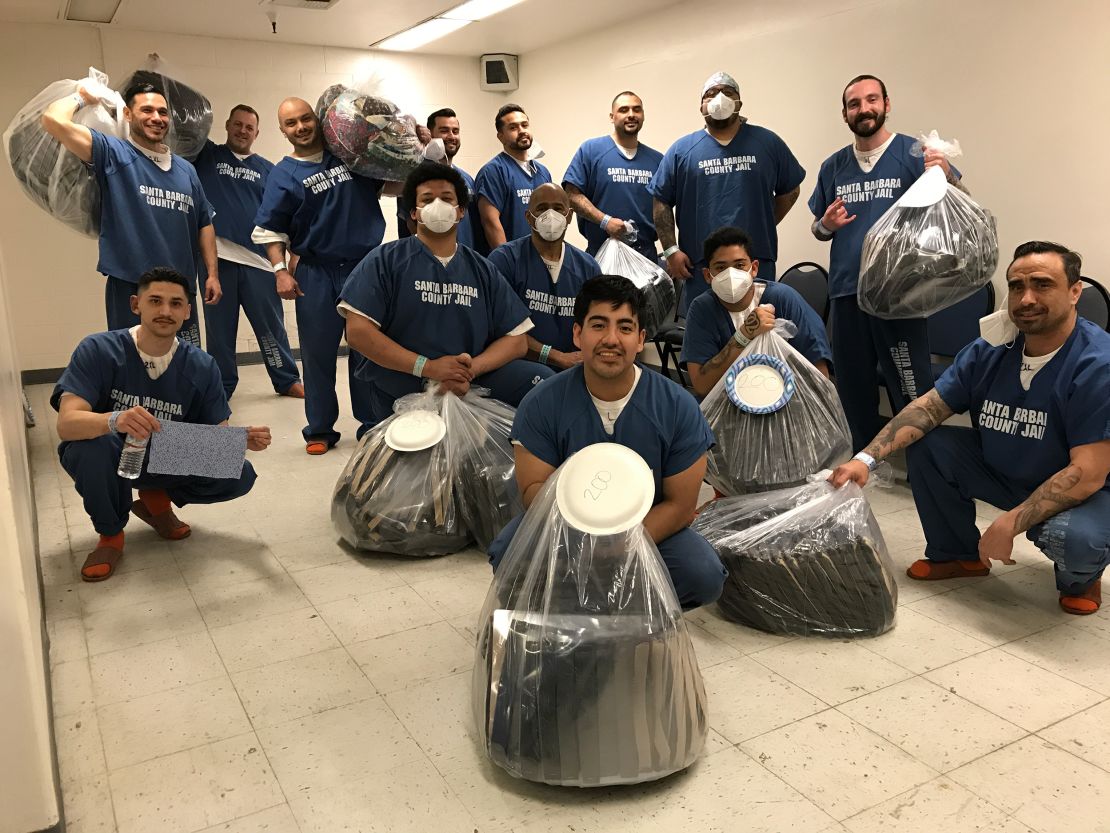When health officials sounded the alarm on the state of the country’s personal protective equipment stockpile, officials at the Santa Barbara County Sheriff’s Department were concerned.
It was mid-March, and coronavirus cases were already surging across the country, including in California. The department knew the best solution was to find an alternative way to source PPE for its first responders and frontline workers.
The question was how?
Meanwhile, at the Santa Barbara County Jail, a group of inmates were also concerned about the pandemic. Twenty two of them decided to approach Deirdre Smith, inmate services manager at the jail, and express their interest in doing something to help their community fight the spread of the virus.
Before Smith was able to come up with a way herself, Santa Barbara County officials reached out to her, she said, expressing a need for help making face shields and masks from scratch.
Smith said it was a natural match.
“They are not only helping themselves, but they’re helping their fellow inmates, as well as thousands of people in the community,” Smith told CNN.

Since it’s virtually impossible to social distance in the jail, the men in their cellblock aren’t required to wear masks around each other – instead, there are strict protocols for those who come into jail, which are very few at this point.
So far, the inmates have made 3,200 face shields, and prepared 6,000 yards of cloth to be made into masks. The jail doesn’t have the sewing equipment to finish masks, but the group hands off the cut fabric to volunteers on the outside who take it from there. As a result, they have received back 900 masks, one for each inmate in the jail, Smith said. In May, they aim to make 10,000 masks.
Prisons across the country, many of which have experienced multiple deadly coronavirus outbreaks, have forced inmates to work on sewing masks and face shields.
But that’s not the case at Santa Barbara County Jail. Only one person tested positive in a population of approximately 1,000, Smith said. And the group of inmates who are volunteering said they are eager to help.
Raquel Zick, the public information officer for the Santa Barbara County Sheriff’s Department, said deputies are grateful to the inmates for their help.
“That equipment is very difficult for us to source,” she told CNN. “Which is why it was really great that we had the inmates volunteer to help provide that equipment and help fill that void.”
Experiencing a pandemic while in jail
Scared. Anxious. Helpless.
These are feelings familiar to so many in the time of coronavirus, including 16 inmates CNN spoke to at the Santa Barbara County Jail.
“There were times where we didn’t know what to expect, it’s that uncertainty, that fear of the unknown that – kind of like in the past led me to make a some poor decisions,” Roy Duran Jr., 38, an inmate at the jail, told CNN.
But Duran said being able to give back to the community in such a hands-on way has helped him navigate those feelings.
It “gave us a sense of power, and control over the spread of this virus, and we’re able to do something to give back, to help people, to save lives,” Duran said.

Zick, the Sheriff’s Department PIO, said she believes the volunteer work has helped inmates “regain one of the freedoms they lose when they find themselves in custody.”
“Oftentimes we think about the freedoms as being able to celebrate birthdays, or other fun things, but when there’s crises, the ability to be part of the solution is also restricted when you’re confined.”
How giving back has impacted inmates
The volunteer work has also helped change people’s perception of inmates, some inmates who CNN spoke to said.
Mark Montoya, a 43-year-old inmate, said he feels that the relationship between deputies and inmates has changed for the better.
“It’s empowering for us to wake up at 6 in the morning, to be drinking our coffee and for them to give us a thumbs up,” Montoya said.
The group of volunteers echoed Montoya, and added that it also feels empowering to know they’re the ones who changed that dynamic.

“I’m not only helping you, they, them,” said Dion Frederick, a 28-year-old inmate, pointing around the room and out into the hallways. “I’m also helping my group of guys here have a better relationship with staff members, like the sheriff’s deputies that take care of us.”
“I had this us-against-them mentality, and the masks that we’re making are for the deputies, they’re for the personnel who work out here,” Frederick said. “So being able to bridge that gap is something that’s phenomenal but it also empowers us.”
Giving back to the community has also helped some inmates value themselves more, they said.
De’Vosia Harper, a 19-year-old inmate, said that the idea that one of his masks could save a life was almost unbelievable.
“It made me feel like a superhero, it made me feel like that was a miracle,” he said.
Harper said he realized the power of the operation once he saw the almost 900 face shields the group made in one day.
“I was in awe, I thought we’d be able to make, like, 30.”
Before their volunteer work began, the group of inmates had been meeting to deconstruct concepts of toxic masculinity, in workshops led by Duran.
When the virus reached the US, they felt compelled to help. Last week, Duran said the group discussed how living with integrity could add to their values and make them better people.
“We’re human beings who’ve made some very poor choices, and I’m not trying to negate that in any way,” he said. “But the message that I want to send is that we’re redeemable, that there’s still hope.”


